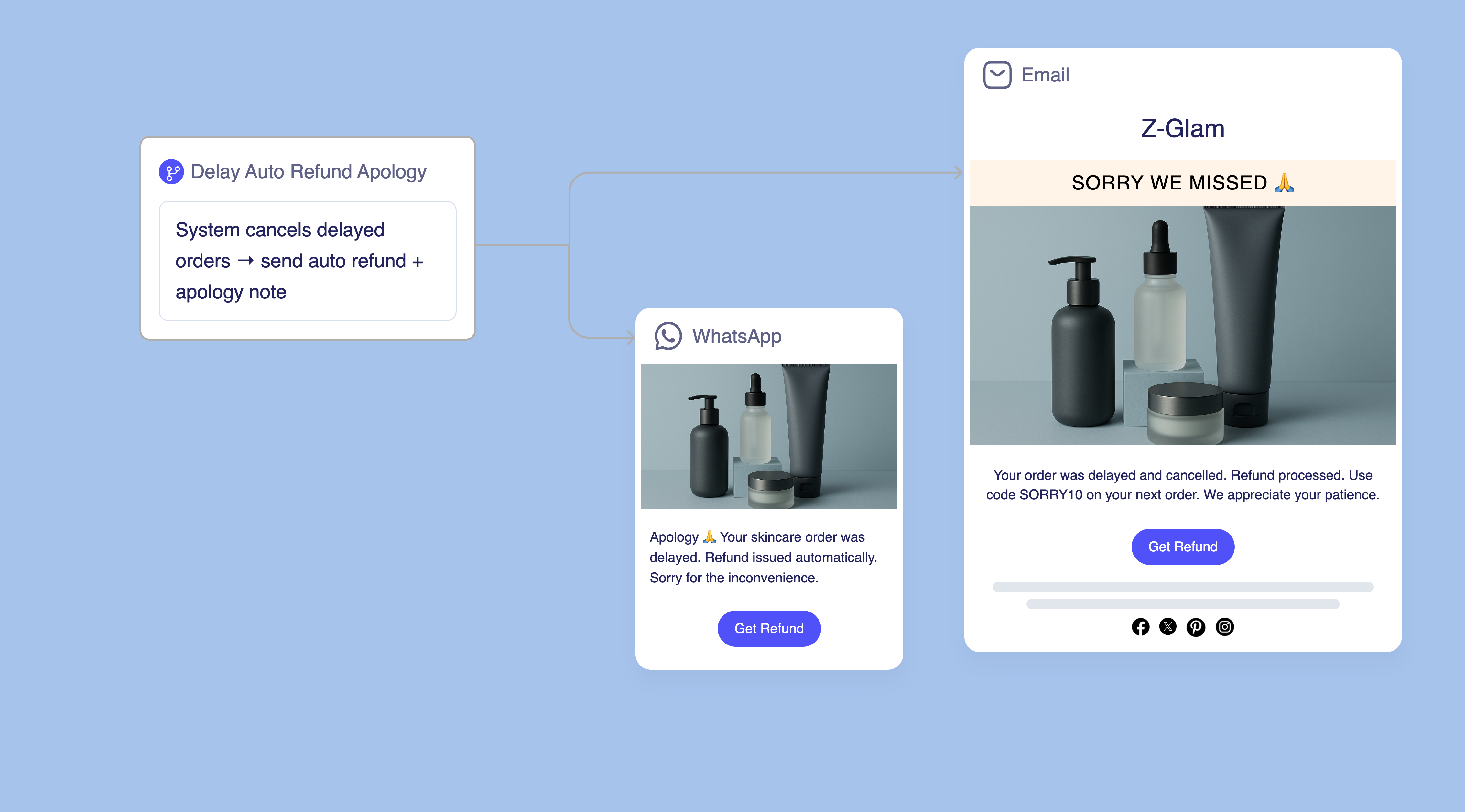
Auto Refund for Delayed Orders
Restore trust by automatically processing refunds and sending sincere apologies when orders are cancelled due to delivery delays.

What is an Auto Refund for Delayed Orders?
This campaign is triggered when a customer cancels an order because of delivery delays. Instead of forcing them to wait or chase support, brands send an instant cancellation confirmation with refund details and a personalized apology. By handling delays transparently and proactively, brands turn a negative moment into an opportunity to preserve customer trust.
Why Auto Refunds for Delayed Orders Matter

Challenges

Opportunities
Outcomes
Restored Customer Trust After Service Failures
Reduced Negative Brand Impact from Delays
Higher Customer Retention Despite Cancellations
Who is it for?
Audience
Exclusions
How it Plays Out
A sample sequence for this use case.
We're sorry we missed the mark. Your order was delayed and cancelled. Refund processing! Use code SORRY on your next order → [CTA]
Sorry, [Name]. Your order was delayed and got cancelled. Refund is on its way. Here's 10% off for your next one → [Link]
Refund update: Your refund has been processed - sorry for the delay experience → [Check Status]
Ready to try again? Use your special discount code for a better experience → [Shop Again]
Best Practices
- Send apology messages immediately after automatic cancellation to demonstrate prompt accountability for service failures.
- Process refunds automatically and provide clear timelines rather than requiring customers to request refunds manually.
- Offer meaningful compensation like discount codes or expedited shipping credits to encourage future purchase attempts.
Auto Refund for Delayed Orders Examples & Prompts
Channel Examples
Automate with Zenie Prompts
With Zenie, you can automatically trigger apology campaigns when SLA breaches result in cancellations.
Explore Similar eCommerce Marketing Strategies
FAQs
Why should businesses automatically cancel and refund delayed orders instead of waiting?
Automatic cancellation after SLA breaches demonstrates respect for customer time and prevents further frustration from extended delays. Proactive cancellation with immediate refunds shows accountability and allows customers to make alternative arrangements rather than waiting indefinitely.
What compensation works best for delay-related cancellations?
Meaningful discounts (10-20%), free shipping credits, or expedited delivery vouchers work well as apology gestures. The compensation should feel substantial enough to acknowledge the inconvenience while encouraging customers to give the brand another chance.
How should apology messages be worded to maintain customer trust?
Use direct, sincere language that acknowledges the failure without making excuses. Take full responsibility, explain what went wrong briefly, and focus on making things right rather than deflecting blame or providing lengthy explanations.
Should delay cancellation apologies include explanations of what caused the delay?
Provide brief, honest explanations when possible, but focus more on accountability and resolution than detailed justifications. Customers typically care more about how you're making things right than extensive explanations of operational issues.
How do you measure the effectiveness of auto refund campaigns for delayed orders?
Track customer retention rates after service failures, discount code redemption rates, customer satisfaction scores for recovery experiences, and repeat purchase rates from customers who experienced delays. Monitor whether proactive apologies lead to relationship recovery rather than permanent churn.


